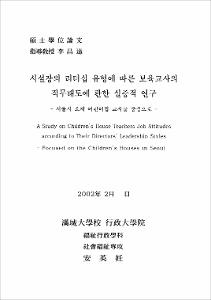시설장의 리더십 유형에 따른 보육교사의 직무태도에 관한 실증적 연구
= (A) study on children's house teachers job attitudes according to their directors leadership styles : focused on the children's houses in Seoul
- Type
- Thesis
- Alternative Title
- 서울시 소재 어린이집 교사를 중심으로
- Department
- 福祉行政學科社會福祉專攻
- Issued Date
- 2002
- Publisher
- 漢城大學校 行政大學院
- Files in This Item:
-
-
Download
 000000066102.pdf
기타 데이터 / 3.18 MB / Adobe PDF
000000066102.pdf
기타 데이터 / 3.18 MB / Adobe PDF
-
Items in Repository are protected by copyright, with all rights reserved, unless otherwise indicated.